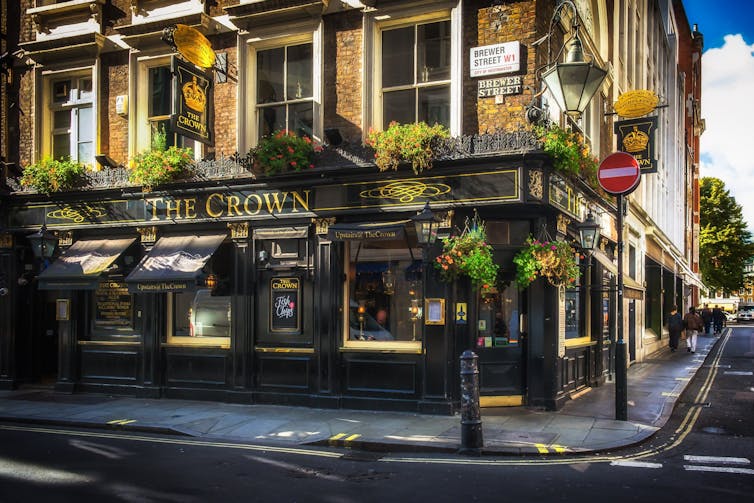As a fashion statement or piece of art, crowns are distinguished by their beauty, containing rare jewels, precious metals and velvet in deep, rich colours. As a symbol, crowns are associated with majesty, authority and sovereignty. And as the coronation of King Charles III reminds us, the crown is also a superlative brand.
Though images of crowns are often used in royal branding, it is rare for monarchs these days to actually wear crowns. In the western monarchical tradition, the British monarchy is an exception, with kings and queens undergoing a crowning ceremony.
In the UK the crown encompasses both the monarch and the government, namely King Charles III and His Majesty’s government. The title of the Netflix drama “The Crown” has made this association clear even to international audiences unfamiliar with British constitutional principles.
The reign of late Queen Elizabeth II was represented by a stylised image of St Edward’s Crown. King Charles III’s reign is represented by an image of the Tudor Crown, which appears in the king’s royal cypher, coat of arms and the invitations for the coronation. In time, it will be seen on state documents, military uniforms, passports and post boxes throughout the UK and the 14 realms where he is head of state.
This piece is part of our coverage of King Charles III’s coronation. The first coronation of a British monarch since 1953 comes at a time of reckoning for the monarchy, the royal family and the Commonwealth.
For more royal analysis, revisit our coverage of Queen Elizabeth II’s Platinum jubilee, and her death in September 2022.
For monarchies, the crown is the quintessential monarchical symbol – something my colleagues and I in the field of corporate marketing research have described as “the crown as a brand”.
Although the European monarchies of Belgium, Denmark, The Netherlands, Luxembourg, Norway, Spain, Sweden and the Vatican, are known as “crowned heads of state”, they forswear coronations and eschew the wearing of crowns. Still, they all use a crown as the marque (or embelem) to represent themselves – see Luxembourg and Denmark’s coats of arms.
Crowns of the coronation
The coronation of King Charles III will be a veritable festival of crowns, featuring seven crowns in total. The king will be crowned with St Edward’s crown by the Archbishop of Canterbury, and he wears this crown once. But during his exit from Westminster Abbey, he will wear the lighter Imperial State Crown. Queen Camilla will also be crowned with Queen Mary’s crown. The last queen consort to undergo a coronation was in 1937.
Four other crowns will be present during the coronation, worn by the kings of arms – senior officers who regulate heraldry (coats of arms) in the UK and participate in major ceremonial occasions.
The three kings of arms from England’s College of Arms will wear crowns decorated with acanthus leaves and engraved with the words of Psalm 50, Miserere mei Deus secundum magnam misericordiam tuam – “Have mercy on me, O God.” Scotland’s king of arms from the Court of the Lord Lyon will wear a crown which is a facsimile of the Scottish royal crown. Heraldry can be viewed as an early form of branding. Many UK universities, for example, have a coat of arms as their visual identity.
An eighth crown – the actual Scottish crown and one of the oldest in Europe – will not be at the coronation, but will be presented to the king at a special service later in the year.
Read more:
How Queen Elizabeth II made the British monarchy into a global brand
Crown brands in business
The exclusiveness and majesty associated with royal crowns has meant that many organisations use a crown as their brand name or logo. The phrase “crowning achievement” refers to an excellent accomplishment. Likewise, a crown in branding communicates quality, status, class and reliability.
Some iconic brands, such as Twinings Tea, Heinz and Waitrose, benefit from an official royal endorsement, having been awarded a royal warrant by a king or queen, or other senior royal family members. They may use the royal coat of arms as a type of royal brand endorsement. The Danish royal warrant entitles an organisation to display “an image of the crown along with the company’s name on signs”. Carlsberg beer is a prominent example of this.
Sometimes permission is granted to use the royal crown as a distinct brand marque as per Royal Ascot horseracing, or in a coat of arms such as in the former Royal College of Science and Technology in Glasgow.
Of course, while some brands have an official royal endorsement, most organisations with a crown name or logo do not have a direct association with monarchy. Sometimes the crown brand name is used for its cultural associations – see the many British pubs called “The Crown”.

Eric Laudonien/Shutterstock
Regal branding has taken hold internationally. Among the companies using a crown name are Couronne (Korean handbags), Crown Bank (USA), Crown Class (Royal Jordanian Airways), Royal Crown Derby (English porcelain), Crowne Plaza Hotels (UK), Crown Royal (Canadian Whiskey), Crown Worldwide Distribution Group (Hong Kong) and Krone (South African sparkling wine). Those with a crown logo include Columbia University (USA), Cunard (UK), Dolce & Gabbana (Italy), Hallmark Cards (USA), Moët and Chandon (France), Ritz Carlton Hotels (USA) and Rolex (Switzerland).
The Mexican beer brand Corona, which uses both a crown name and logo, is the most valuable beer brand in the world, worth US$7 billion.
Even in a world of republics, it is clear that the crown as a brand not only endures, but flourishes. The crowning of the king and queen will be the zenith of the coronation service. For producers of Corona beer and other brands featuring crowns around the world, the visual and verbal link of crown and monarchy will be, in a way, a reminder to consumers that their products are fit for a king.




